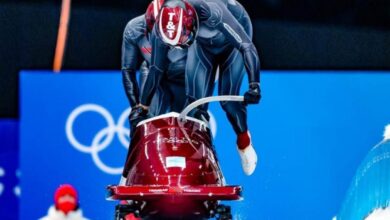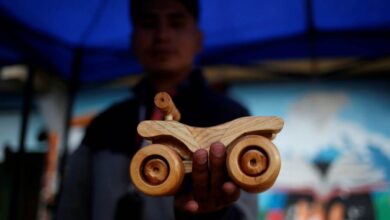Neither in Football Nor in the Olympics: Why Does Bolivia Not Shine in Sports?
The altiplano delegation occupies the 14th place in the South American Games without a single gold medal to date. In addition to this, historically there are few achievements, even in football, where neither their teams nor their national team have been able to stand out in the international arena.

Photo: elpotosi.com
LatinAmerican Post | Onofre Zambrano Moreno
Listen to this article
Leer en español: Ni en fútbol ni en olímpicos: ¿Por qué Bolivia no brilla en los deportes?
Bolivia is the only South American delegation that does not occupy a box in the top ten of the medal table in the framework of the South American Games that are held in Asunción, Paraguay. Even two of its main references for obtaining medals in the aforementioned event, Vidal Basco and David Ninavia in the 5 thousand meter dash, failed in the main objective.
It is no secret to anyone that sport in Latin America in general lacks structure and therefore investment, but in some countries the problem is even more acute, as in Bolivia. This situation, including football, the most popular discipline, which for many years, has not generated any joy.
Also read: South American Games: Everything You Need to Know About It
Their clubs roam the continental competitions and their national team has been in the penultimate box for two qualifying rounds, only ahead of Venezuela, the region's traditional Cinderella, but which had surpassed it in the qualifying round for Brazil 2014. The concern is base and the leadership, it seems, does little to change this reality.
Causes and Context
EF Deportes points out that Bolivian sport in the field of national politics had its correlative beginning with the creation of the Armed Forces. From then on, attempts have been made to develop sport without having a national policy on the matter, since they lack sustainable public policies.
This is evidenced, for example, in the intermittent participation in events of the Olympic cycle and in the fact of desisting on several occasions from the organization of events at the Bolivarian and South American level due to insufficient economic financing, specifically in the 2011 events, 2014 and 2017.
In this South American nation, there is an absence of adequate sports infrastructure. Also, does not have training entities in the area, which generates the situation of low sports performance, incipient achievements, low physical culture in society, deficit in the training of human resources, infrastructure of sports facilities not suitable with world standards, management lack of science and technology in sport, and an organization that excludes talent.
In the EF Deportes publication, it is concluded that a qualification of human resources is necessary that generates greater investment interest to work on better sports infrastructure and equipment. Likewise, it is necessary to comply with the comprehensive and holistic sports process that is required in these cases. The situation is not a secret. It is even a matter of national interest. Conrrado Moscoso, from Chuquisaca, world racquetball champion, the most successful athlete in this country in recent years, left a clear message in favor of Bolivian athletes and in front of the main local authorities.
"There are always difficulties for everything, and we know very well that sport throughout Bolivia, with the apologies of the headliner, is not well valued," Moscoso said at a public event, and after which he won applause from those attending the massive reception. The world monarch reiterated: “Bolivia can be a power and regardless of the inconveniences, the Bolivian has always been outstanding in all sports,” according to Correo del Sur.
Moscoso has just obtained the Open world championship by beating the American Rocky Carson, in the final of the tournament played in San Luis Potosí (Mexico). In this contest, he also achieved a silver medal in doubles and two bronze medals in mixed and team doubles. His achievements are not taken into account to promote the rest of the sports structure in the highland country.
Not Much to Be Proud Of
In Bolivia, they have a lot of faith in their fondistas and some even describe them as a gold mine. David Ninavia, one of them, is today the athlete with the greatest projection in that national territory, since at just 19 years old he triumphed in several tests abroad.
The athletics group is known as “Wind Foot” and is led by the experienced Marcelo Peñaranda. It is made up of the most talented crew in Bolivia: Héctor Garibay, and the aforementioned Basco and Ninavia. Basco has been awarded gold in the 10 km run in Cipolletti (Argentina) plus gold and silver in the XLX Bolivarian Sports Games in Valledupar (Colombia) in 2021.
But they are still isolated achievements that have no continuity, as was demonstrated days ago in Asunción, when neither Basco nor Ninavia responded to expectations. Ninavia, in fact, confronts the problem of all Bolivian athletes, the lack of support.
The long-distance runner is part of the Tunca state program, a bureaucratic initiative, which is generated from the Ministry of Health after the annulment of the Ministry of Sports. “Sometimes the disbursement takes six months; in that period you have to train and travel, and resources are needed…”, explained coach Peñaranda to Eju.tv.
Gymnast Fabiana Abastoflor was also unable to achieve the main objective of obtaining medals despite advancing to the final of the Multiple Individual event, an event in which she had a positive previous classification. The Santa Cruz women also participated in the ribbon and mace tests, in which she obtained encouraging results, but she did not manage to settle in the final series of either of the two modalities.
The athlete stated prior to the final competition: “There is nothing in life that cannot be achieved with hard work and dedication. Behind me there are tears, pain, stress, tiredness, but I know that the effort is really worth it and despite everything I am very happy and proud of myself”, according to El Diario.net. Those words reflect how difficult it is for any Bolivian athlete to achieve their dreams due to poor management.




